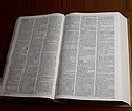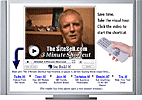|
Language Dictionary Yesterday and Today
 It goes without saying that a language dictionary plays an important part in the modern culture: it reflects knowledge accumulated by society over centuries. In today’s globalized world, dictionaries have gained the same popularity as cookbooks, the Bible and the Koran. According to the available research data, 90% of English families have at least one dictionary. By the way, how many dictionaries do you have?
It goes without saying that a language dictionary plays an important part in the modern culture: it reflects knowledge accumulated by society over centuries. In today’s globalized world, dictionaries have gained the same popularity as cookbooks, the Bible and the Koran. According to the available research data, 90% of English families have at least one dictionary. By the way, how many dictionaries do you have?
A language dictionary has become an integral part of the human culture long time ago. People have been using dictionaries for centuries. Actually, the first prototype dictionaries were created thousands years ago. Their function was to explain “hard words”. The examples are glossaries of Sumerians dated the 25th century BC and Chinese glossaries dated the 20th century BC. In addition, the ancients compiled lists of words (so called vocabularies) for different purposes. For example, trilingual Sumerian-Akkadian-Hittite tablets dated the 14-13 centuries BC and the Egyptian Ramesseum Onomasticon dated 1750 BC that contained words grouped into different categories such as birds, fishes, plants, animals, types of oils, Nubian fortresses, Upper Egyptian cities, etc. Other examples are lists of Sanskrit terms from astronomy, medicine and botany compiled after the 5th century AD. The earliest dictionaries were written on papyrus, parchment, board, pottery, leather. Later on, on paper. The present is characterized by the increasingly widespread use of electronic dictionaries and online dictionaries. So a language dictionary serves for the benefit of mankind for many centuries. But where does the word originate from? Etymologically, dictionary is derived from Medieval Latin dictionarius meaning "a collection of dictions (words)." An English teacher John Garland first used dictionarius in this sense to name a list of Latin words to be learned by heart by his students. That was in c. 1225. Probably the first language dictionary published under the English title "Dictionary" was Sir Thomas Elyot’s Dictionary (Latin-English) which appeared in 1538. Modern dictionaries are divided into two types: encyclopedias and linguistic dictionaries:
A list of good English language dictionaries is available online here.
What is the difference between Figuratively speaking, a glossary is a “younger brother” of a language dictionary. A dictionary consists of a great number of words and definitions about different subjects. Of course, there are specialized dictionaries (for example, medical or economic dictionaries), but glossaries are much more specialized and much smaller in size. Dictionaries are thick books officially recognized and published (on paper or in the electronic format), with explanations and definitions of words/terms, examples of their usage, and some etymological information. Glossaries are lists of words often complied for a personal use. You do not have to be a lexicographer to compile a glossary for yourself.
Loading
Reviews of translation dictionaries Foreign Language Dictionary: Always Right, Always Accurate? And Which One Is For You? Return from Language Dictionary Page to Home Page _____________________________________________________________________ Website owner: Irina Lychak, self-employed freelance linguist, Russian translator, Ukrainian translator, Kiev (Kyiv), Ukraine |
Would you like to build a solid, long-term future for yourself? If yes, keep on reading. Building an online business as a source of extra income was my long-standing dream. I tried two free and one paid web site builders but failed. Not because of my ignorance of HTML codes, but because of the lack of proper tools for and basic knowledge about building business online. However, what was once a pipe dream, now is happening. How come? My answer is "Site Build It!". Watch the TV program below for more details. If you are serious about building a stable future for yourself and your children, ACT NOW:
Most Popular Pages of the Site: |






